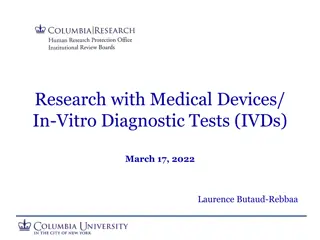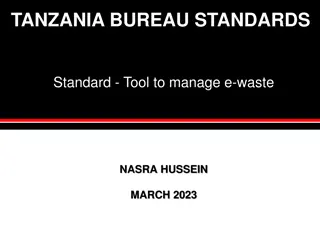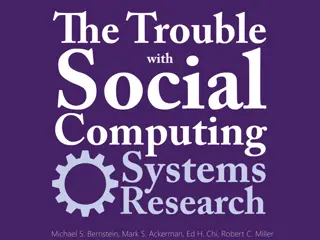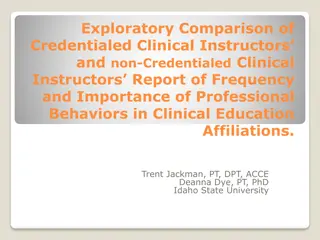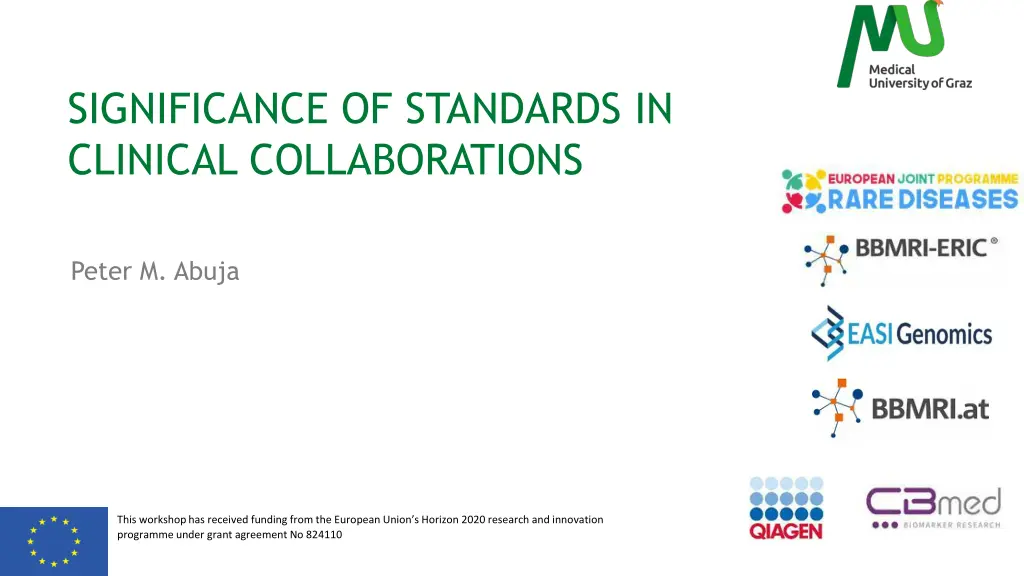
Significance of Standards in Clinical Collaborations
Explore the importance of standardized sample procurement in clinical collaborations to address reproducibility challenges and meet regulatory requirements. Learn how implementing ISO and CEN standards can enhance data quality, decision-making, and research outcomes in biobanking.
Download Presentation

Please find below an Image/Link to download the presentation.
The content on the website is provided AS IS for your information and personal use only. It may not be sold, licensed, or shared on other websites without obtaining consent from the author. If you encounter any issues during the download, it is possible that the publisher has removed the file from their server.
You are allowed to download the files provided on this website for personal or commercial use, subject to the condition that they are used lawfully. All files are the property of their respective owners.
The content on the website is provided AS IS for your information and personal use only. It may not be sold, licensed, or shared on other websites without obtaining consent from the author.
E N D
Presentation Transcript
SIGNIFICANCE OF STANDARDS IN CLINICAL COLLABORATIONS Peter M. Abuja This workshop has received funding from the European Union s Horizon 2020 research and innovation programmeunder grant agreement No 824110
Why this presentation? Present status of standardization in sample procurement is still not sufficient in light of the reproducibility crisis and the IVDR requirements Human biological samples are mainly obtained through routine healthcare There is still reluctance of physicians to introduce and strictly follow standardized sample procurement workflows Habits, lack of knowledge/understanding of adverse consequences This presentation intends to support you in convincing clinical partners to perform standardized sample procurement
The (not yet) past status Samples are still produced in healthcare routine without standardized documentation of the procedures used no accountability for fitness-for-purpose Samples are produced by procedures that are even in contrast to best practice (and standards) are not useable in good scientific and clinical practice E.g. tissue samples that are just put into the freezer (no snap-freezing) unusable for molecular analyses and morphology (diagnosis) E.g. serum or plasma samples that were not prepared in the correct way wrong diagnoses, useless for R&D! and these deviations are often (see 2nd example) not even documented, so you do not know that they will lead to wrong results
The present status Biobanks aim at providing samples obtained according to current ISO and CEN standards because others cannot be used in R&D after May 26, 2022 Such samples may be obtained in collaboration between scientists and clinicians that are willing and able to implement standardized workflows Biobanks can help in the implementation and propagation of appropriate workflows
What is the reason for standardization? Accounting for validity of analysis results as a prerequisite for data interoperability and reusability requires defined sample quality To allow deciding on fitness-for-purpose of data, now and in the future Document all steps that can affect the final analytical result Evaluate all procedures used how they contribute to fitness-for-purpose Documentation becomes metadata accompanying analytical data Defined-quality samples reliable, high-quality data reliable studies better R&D more reliable diagnoses and treatment less money wasted in R&D and in healthcare
How can we produce such samples? Human biological material is predominantly produced in (clinical) healthcare by physicians and other medical professionals They must be convinced that standardization of sample procurement is in line with their own priorities in healthcare processes Reluctance to include procedures into healthcare routine that go beyond patients needs standardized sample procurement is in the interest of the patient regarding law, ethics, safety (diagnoses, treatment), diagnostic and therapeutic R&D If well organized, standardized sample procurement does not interfere with routine healthcare procedures.
Arguments for standardized sample procurement Human biological samples are valuable and expendable Many diseases (e.g. rare diseases) require a long time to collect scientifically useful cohorts Not accounting for the quality of samples is not an option! FAIR data must be of defined quality (highest quality presently achievable) accountability along the pre-analytical and analytical workflow this should be an ethical principle (good scientific/medical practice) A sample without sufficient documentation is expensive hospital waste Documentation of all procedures core of CEN/ISO standards
Who should implement standardized workflows? Collecting everything may not be the best strategy so .. let everyone do what s/he does best Biobanks Focus on supporting and implementing standardized workflows Logistic support (procedures, documentation, storage, training) Scientists/clinicians Collect the samples, data, knowledge Focus on building specific cohorts instead of collecting everything
Benefits for Scientists Clinicians Accountability for data quality and see left box reliability Better diagnoses and diagnostics High-ranking journals will request Ethical reasons documentation/standards Biobanks Funding institutions increasingly demand Standardized, more valuable cohorts use of standards Higher use and turnover Data can be reused according to FAIR principles Total cost may be lower
Thank you! Contact: Peter M. Abuja Medical University of Graz, Austria Peter.abuja@medunigraz.at




